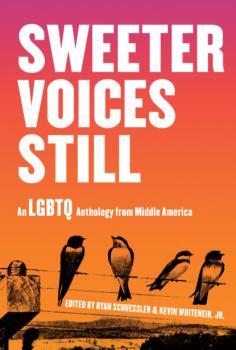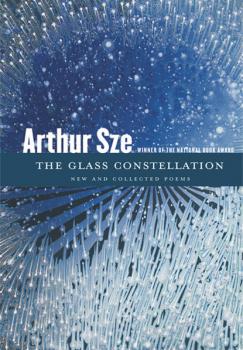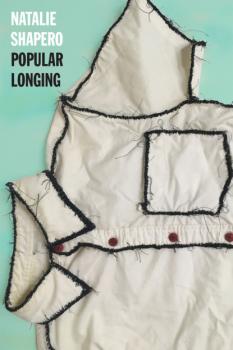ТОП просматриваемых книг сайта:
Ingram
Все книги издательства IngramАннотация
The middle of America—the Midwest, Appalachia, the Rust Belt, the Great Plains, the Upper South—is a queer place, and it always has been. The queer people of its cities, farms, and suburbs do not exist only to serve as “blue dots” within “red states.” Every story about the kid from Iowa who steps off the bus in Manhattan, ready to “finally” live, is a story about the kid who was already living in Iowa. <em>Sweeter Voices Still</em> is about that kid and has been written by people like them. This collection features queer voices you might recognize—established and successful writers and thinkers—and others you might not—people who don’t think of themselves as writers at all. You'll find these truths within these pages: Transgender women and men are women and men, “they” and “them” can be singular pronouns, Black lives matter, sex work is work, and you don’t have to go to a gay bar to be gay—and it’s okay if you do, too. You’ll find sex, love, and heartbreak and all the beings we meet along the way: trees, deer, cicadas, sturgeon. Most of all, you'll find real people.
<p>Featuring a foreword by Northwestern University professor Doug Kiel.
<p>Contributors: Kemi Alabi, Samuel Autman, Neema Avashia, Lars Avis, Joss Barton, Yasmin Bashir, Jeffery Beam, Zach Benak, Taylor Brorby, Jasmine Burnett, River Coello, Edward M. Cohen, Brian Czyzyk, Harmony Cox, Gene Dawson, Patrick Del Percio, Dominick Duda, Joanna Eleftheriou, Aaron Foley, Christopher Gonzalez, Stacy Grover, Elizabeth Harper, Jackie Hedeman, Jessica Jacobs, C.J. Janovy, Jessie Keary, Owen Keehnen, River Ian Kerstetter, Doug Kiel, Jocelyn Krueger, Nichole Lohrman-Novak, Raymond Luczak, Ka “Oskar” Ly, K. Ann MacNeil, Mary Maxfield, Gabe Montesanti, Jennifer Morales, Kalene Nisly, Andriy Partykevich, Robert L. Patrick, Kay Patterson, Angela Pupino, Kai Minosh Pyle, Samer Hassan, Michael Schreiber, Sharon Seithel, L.S. Quinn, Jose Quinones, Sarah Sala, James Schwartz, Gregg Shapiro, Joel Showalter, Carmen Smith, Robyn Steely, Sylvia Sukop, Alyson Thompson, Janine Tiffe, Steffan Triplett, April Vazquez, Evan Williams
<p>Featuring a foreword by Northwestern University professor Doug Kiel.
<p>Contributors: Kemi Alabi, Samuel Autman, Neema Avashia, Lars Avis, Joss Barton, Yasmin Bashir, Jeffery Beam, Zach Benak, Taylor Brorby, Jasmine Burnett, River Coello, Edward M. Cohen, Brian Czyzyk, Harmony Cox, Gene Dawson, Patrick Del Percio, Dominick Duda, Joanna Eleftheriou, Aaron Foley, Christopher Gonzalez, Stacy Grover, Elizabeth Harper, Jackie Hedeman, Jessica Jacobs, C.J. Janovy, Jessie Keary, Owen Keehnen, River Ian Kerstetter, Doug Kiel, Jocelyn Krueger, Nichole Lohrman-Novak, Raymond Luczak, Ka “Oskar” Ly, K. Ann MacNeil, Mary Maxfield, Gabe Montesanti, Jennifer Morales, Kalene Nisly, Andriy Partykevich, Robert L. Patrick, Kay Patterson, Angela Pupino, Kai Minosh Pyle, Samer Hassan, Michael Schreiber, Sharon Seithel, L.S. Quinn, Jose Quinones, Sarah Sala, James Schwartz, Gregg Shapiro, Joel Showalter, Carmen Smith, Robyn Steely, Sylvia Sukop, Alyson Thompson, Janine Tiffe, Steffan Triplett, April Vazquez, Evan Williams
Аннотация
The Dayton Anthology , the fifteenth in Belt's City Anthologies series, is a portrait of a city recovering from the twin 2019 crises of devastating tornadoes and the mass shooting that took the lives of nine residents. Through essays and poems, contributors reflect on these traumas, and the longer-term ills of disinvestment and decay that have plagued the city for years, but also on the resilience of the people who call Dayton home. This is the city that brought the world the Wright brothers' invention of flight, along with the cash register, the hydraulic pump, and other technological innovations, but also the soaring poetry of Paul Laurence Dunbar, and the comedy of Dave Chappelle. With contributions from Dayton Mayor Nan Whaley and former Ohio Governor Bob Taft.
Информация о книге
Автор произведения Группа авторов
Жанр Книги о Путешествиях
Серия Belt City Anthologies
Аннотация
Between 1927 and 1979, more than 8,000 people were involuntarily sterilized in five hospitals across the state of Virginia. From this plain and terrible fact springs Elizabeth Catte’s <i>Pure America</i>, a sweeping, unsparing history of eugenics in Virginia, and by extension the United States. Virginia’s twentieth-century eugenics program was not the misguided initiative of well-meaning men of the day, writes Catte, with clarity and ferocity. It was a manifestation of white supremacy. It was a form of employment insurance. It was a means of controlling “troublesome” women and a philosophy that helped remove poor people from valuable land. It was cruel and it was wrong, and yet today sites where it was practiced like Western State Hospital, in Staunton, VA, are rehabilitated as luxury housing, their histories hushed up in the service of capital. As was amply evidenced by her acclaimed 2018 book <em>What You Are Getting Wrong About Appalachia</em>, Catte has no room for excuses; no patience for equivocation. What does it mean for modern America, she asks here, that such buildings are given the second chance that 8,000 citizens never got? And what possible interventions can be made now, repair their damage?
Аннотация
ACCLAIMED NOVELS & AUTHOR: Nava is one of the most important, prominent, most beloved writers in queer Latino literature writing today. In the gay mystery community, he is a household name. This book expands the reach into contemporary topics surrounding the gay community. AUTHOR IS ONE OF THE MOST RECOGNIZED NAMES IN QUEER FICTION: The author is a seven-time Lambda Literary Award winner, and his books have received raving NYT reviews. A TIMELY TOPIC: Given the social upheaval surrounding Black and Brown Lives Matter, and the political attention of LGBT+ rights, this the perfect time for this powerful novel to be published. Tight, lyrical language, and perfectly placed details give the story power and vividness that make it all come instantly alive for the reader.
Аннотация
In Kelli Russell Agodon’s fourth collection, each poem facilitates a humane and honest conversation with the forces that threaten to take us under. The anxieties and heartbreaks of life—including environmental collapse, cruel politics, and the persistent specter of suicide—are met with emotional vulnerability and darkly sparkling humor. <em> Dialogues with Rising Tides</em> does not answer, This or that? It passionately exclaims, And also! Even in the midst of great difficulty, radiant wonders are illuminated at every turn.
Аннотация
In her astounding third collection, Nikki Wallschlaeger turns to water—the natural element of grief—to trace history’s interconnected movements through family, memory, and day-to-day survival. <em> Waterbaby</em> is a book about Blackness, language, and motherhood in America; about the ancestral joys and sharp pains that travel together through the nervous system’s crowded riverways; about the holy sanctuary of the bathtub for a spirit that’s pushed beyond exhaustion. Waterbaby sings the blues in every key, as Wallschlaeger uses her vibrant lexicon and varied rhythms to condense and expand emotion, hurry and slow meaning, communicating the profound simultaneity of righteous dissatisfaction with an unjust world, and radical love for what’s possible.
Аннотация
Sze’s poetry generates poignant correspondences and startling intimacies, offering readers a deep and daily grounding in the world.<br><br>
<ul><li>Sze’s most recent collection <em>Sight Lines</em> won the 2019 National Book Award. <br> <li>Sze is highly critically acclaimed—<em>Compass Rose</em> was a Pulitzer Prize finalist and his other works have received national honors such as the Jackson Poetry Prize and the American Book Award <br> <li>Copper Canyon has published Sze since the 1990s, with a collection of new and selected poems, numerous collections of original poetry, and a collection of translations from the Chinese. <br> <li>Sze’s writing draws and breaks from Chinese poetry and philosophical tradition. His negotiation of cultural influence and difference has made his work foundational to many Asian American writers. <br> <li>Sze’s work marks a significant contribution to the ecopoetics genre, his writing drawing from indigenous and non-Western lifeworlds and advocating an ethics of deep and transformative notice.<br> <li>Sze’s writing articulates a response to global and environmental injustices, enacting a deep sense of connectivity and collective obligation.<br> <li>Sze’s work is particularly resonant to the Southwest. His previous collection <em>The Ginkgo Light</em> (2009) received the PEN Southwest Book Award and his poetry is imbued with New Mexico’s long-line mesas and the many cultures native to the region. </ul>
<ul><li>Sze’s most recent collection <em>Sight Lines</em> won the 2019 National Book Award. <br> <li>Sze is highly critically acclaimed—<em>Compass Rose</em> was a Pulitzer Prize finalist and his other works have received national honors such as the Jackson Poetry Prize and the American Book Award <br> <li>Copper Canyon has published Sze since the 1990s, with a collection of new and selected poems, numerous collections of original poetry, and a collection of translations from the Chinese. <br> <li>Sze’s writing draws and breaks from Chinese poetry and philosophical tradition. His negotiation of cultural influence and difference has made his work foundational to many Asian American writers. <br> <li>Sze’s work marks a significant contribution to the ecopoetics genre, his writing drawing from indigenous and non-Western lifeworlds and advocating an ethics of deep and transformative notice.<br> <li>Sze’s writing articulates a response to global and environmental injustices, enacting a deep sense of connectivity and collective obligation.<br> <li>Sze’s work is particularly resonant to the Southwest. His previous collection <em>The Ginkgo Light</em> (2009) received the PEN Southwest Book Award and his poetry is imbued with New Mexico’s long-line mesas and the many cultures native to the region. </ul>
Аннотация
The poems of Natalie Shapero’s third collection, Popular Longing, highlight the ever-increasing absurdity of our contemporary life. With her sharp, sardonic wit, Shapero deftly captures human meekness in all its forms: our senseless wars, our inflated egos, our constant deference to presumed higher powers—be they romantic partners, employers, institutions, or gods. “Why even / look up, when all we’ll see is people / looking down?” In a world where everyone has to answer to someone, it seems no one is equipped to disrupt the status quo, and how the most urgent topics of conversation can only be approached through refraction. By scrutinizing the mundane and all that is taken for granted, these poems arrive at much wider vistas, commenting on human sadness, memory, and mortality. Punchy, fearlessly ironic, and wickedly funny, Popular Longing articulates what it means to share a planet, for better or more often for worse, with other people.
Аннотация
Bob Hicok’s <i>Red Rover Red Rover</i> is joyous and macabre, hopeful and morbid, caring and critical. These poems are apocalyptic in tone but tender in their depiction of dying animals, disappearing water, raging fires, and the humans to blame. He calls attention to the dire costs of modern conveniences and begs for our willingness to change. No subject is too high or low for his wide-sweeping gaze, a comfort with extremes that gives his work the quality of an embrace. Threads of humor, romance, and kindness suggest America’s capacity to transcend the disastrous present: “heaven’s everywhere / someone needs a place to rest // and someone else says, / Come in.” Hicok presents a high-stakes game of survival and connection.
Аннотация
Alex Dimitrov’s third book, <i>Love and Other Poems, </i>is full of praise for the world we live in. Taking time as an overarching structure—specifically, the twelve months of the year—Dimitrov elevates the everyday, and speaks directly to the reader as if the poem were a phone call or a text message. From the personal to the cosmos, the moon to New York City, the speaker is convinced that love is “our best invention.” Dimitrov doesn’t resist joy, even in despair. These poems are curious about who we are as people and shamelessly interested in hope.










